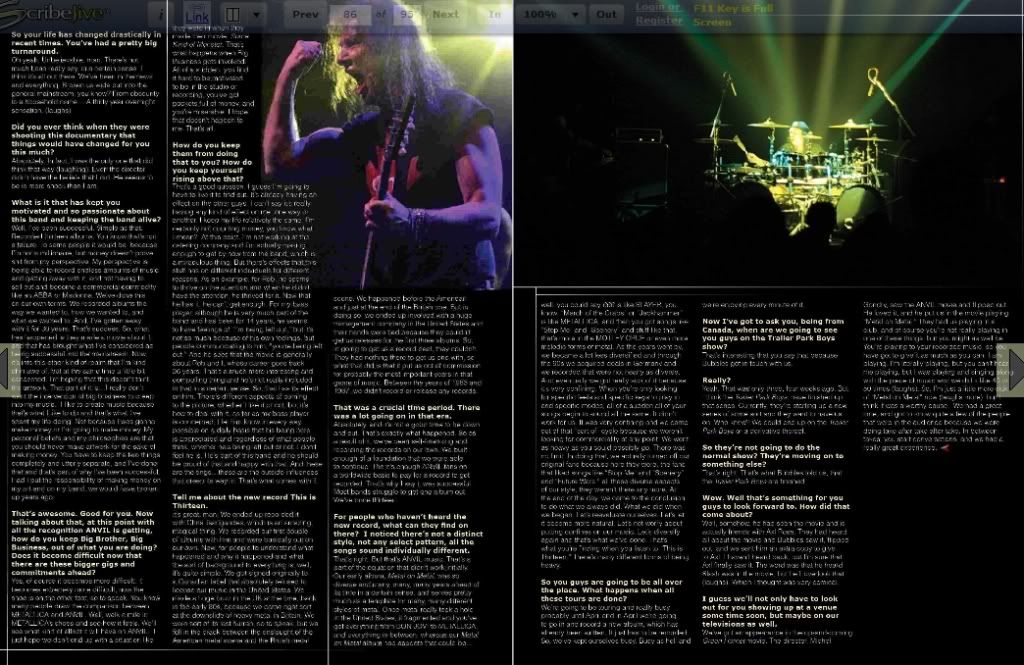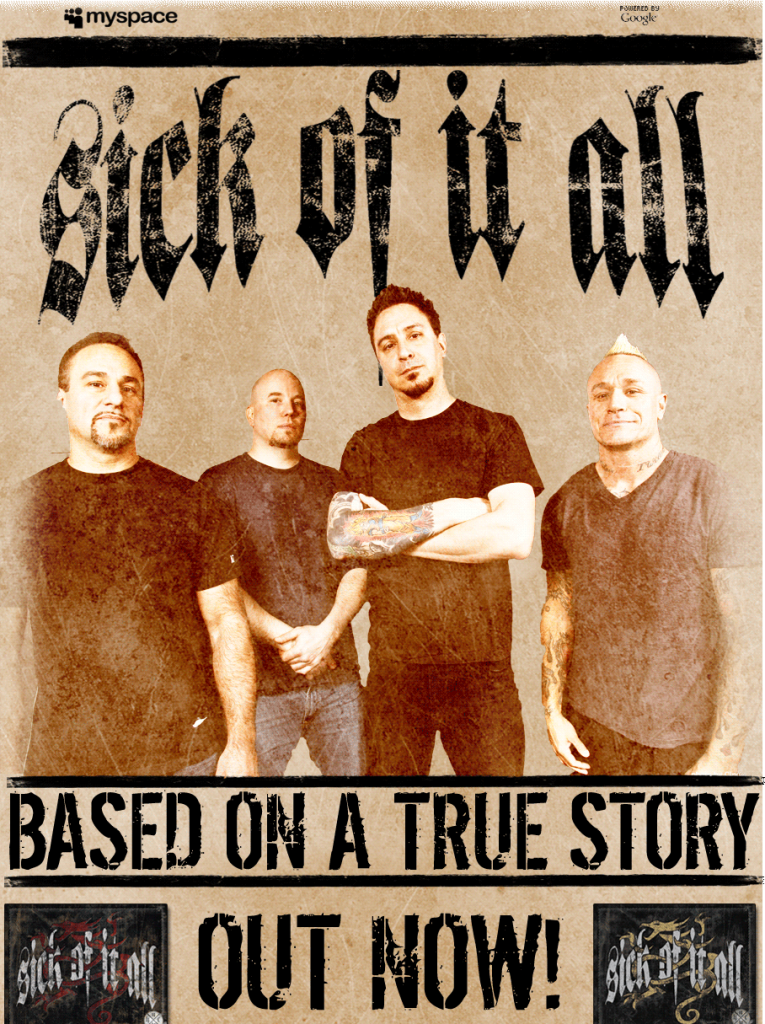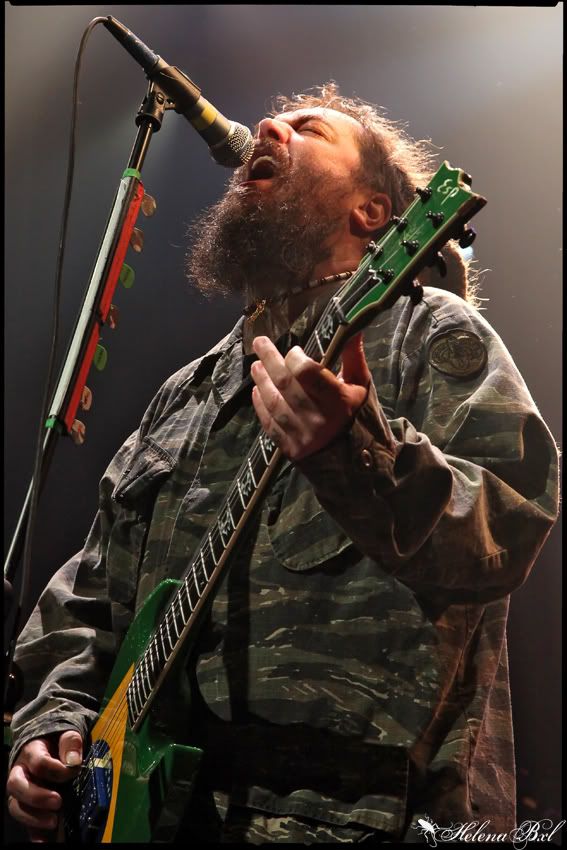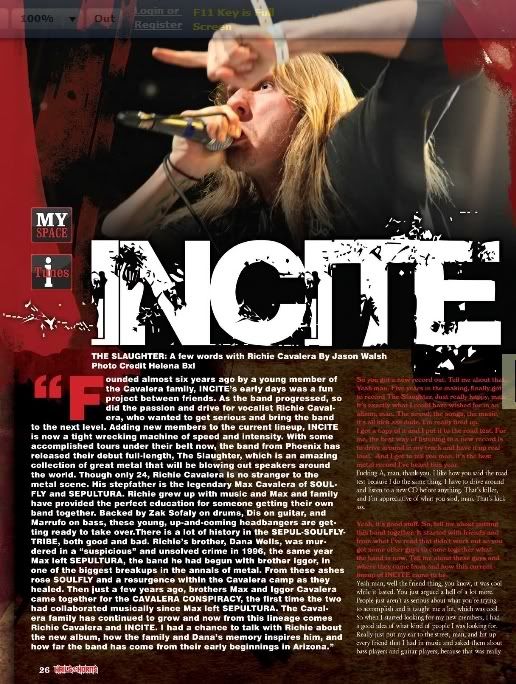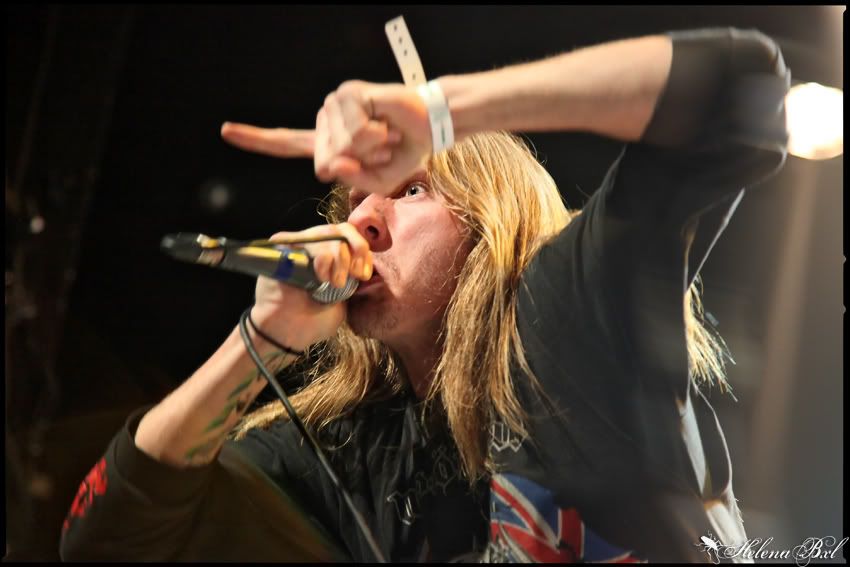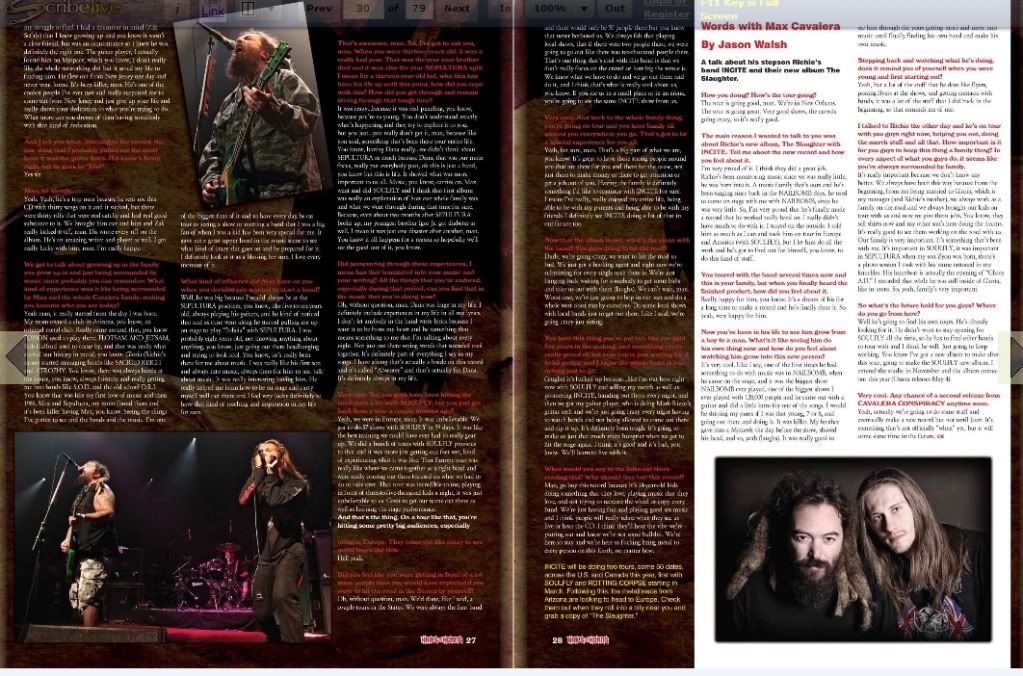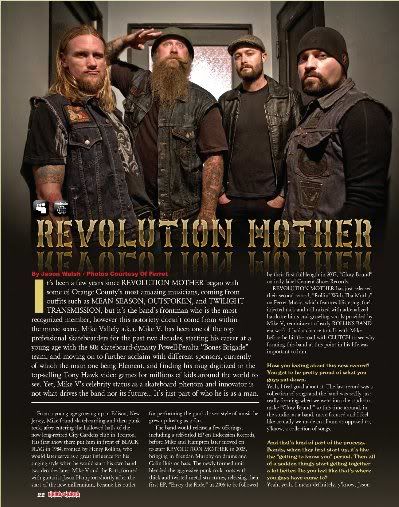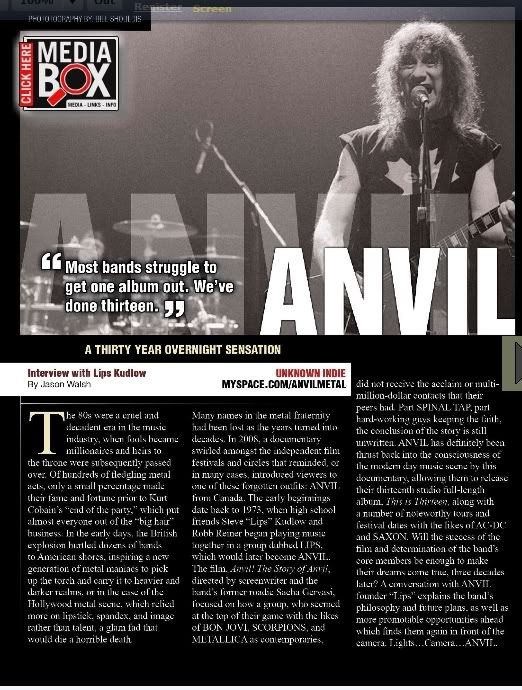
ANVIL
“This is Thirteen”
by Jason Walsh
The 80s were a cruel and decadent era in the music industry, when fools became millionaires and heirs to the throne were subsequently passed over. Of hundreds of fledgling metal acts, only a small percentage made their fame and fortune prior to Kurt Cobain’s “end of the party,” which put almost everyone out of the “big hair” business. In the early days, the British explosion hurtled dozens of bands to American shores, inspiring a new generation of metal maniacs to pick up the torch and carry it to heavier and darker realms, or in the case of the Hollywood metal scene, which relied more on lipstick, spandex, and image rather than talent, a glam fad that would die a horrible death.
Many names in the metal fraternity had been lost over the years…decades. In 2008, a documentary swirled amongst the independent film festivals and circles that reminded, or in many cases, introduced viewers, to one of these forgotten outfits: Anvil from Canada. The early beginnings date back to 1973, when high school friends Steve “Lips” Kudlow and Robb Reiner began playing music together in a group dubbed Lips, which would later become Anvil. The film, “Anvil! The Story of Anvil,” directed by screenwriter and the band’s former roadie Sacha Gervasi, focused on how a group who seemed at the top of their game with the likes of Bon Jovi, Scorpions, and Metallica as contemporaries, did not receive the acclaim or multi-million-dollar contacts that their peers had. Part Spinal Tap, part hard-working guys keep the faith, the conclusion of the story is still unwritten. Anvil has definitely been thrust back into the consciousness of the modern day music scene by this documentary, allowing them to release their thirteenth studio full-length album, “This is Thirteen,” along with a number of noteworthy tours and festival dates with the likes of AC-DC and Saxon. However, will the success of the film and determination of the band’s core members be enough to make their dreams come true, three decades later? A conversation with Anvil founder “Lips” explains the band’s philosophy and future plans, as well as more promotable opportunities ahead which finds them again in front of the camera. Lights…Camera…Anvil.
Lips, how are you doing today?
Pretty good.
I wanted to talk with you and see how things are going?
Oh, they’re going good, man. What can be said? (laughs)
So your life has changed drastically in recent times. You’ve had a pretty big turnaround.
Oh yeah. Unbelievable, man. There’s no much I can really say, in a certain sense. I think it’s all out there. We’ve been in the news and everything. Broken us wide out into the general mainstream, you know. From obscurity to a household name. A thirty year overnight sensation. (laughs)
Now did you ever think when they were shooting this documentary that things would have changed for you this much?
Absoultely. In fact, I was the only one that did think that way (laughing). Even the director didn’t have the beliefs that I did. He seems to be in more shock than I am.
What is it that has kept you motivated and so passionate about this band and keeping the band alive?
Well, I’ve been successful. Simple as that. Recorded thirteen albums. You know that’s not a failure. To some people it would be because I’m not a millionaire, but money doesn’t prove shit from my perspective. My perspective is being able to record endless amounts of music and getting away with it, and not having to sell out and become a commercial commodity like an ABBA or Madonna. We’ve done this on our own terms, we recorded albums the way we wanted to, how we wanted to, and what we wanted to. And, I’ve gotten away with it for 30 years. That’s success. So, what has happened is they made a movie about it and that has brought what I’ve considered as being successful into the mainstream. Now, it’s into this other kind of realm that I’m kind of in awe of, but at the same time a little bit concerned. I’m hoping that this doesn’t taint the artwork. That part of it is…I really don’t want the intervention of big business to creep into my music. I like to create music because that’s what I like to do and that’s what I’ve spent my life doing. Not because I was gonna make money or I’m going to make money. My personal beliefs and my philosophies are that you should never make artwork for the sake of making money. You have to keep the two things completely and utterly separate, and I’ve done that and that’s part of why I’ve been successful. Had I put the responsibility of making money on my art and on my band, we would have broken up years ago.
So for you, it’s still about the passion of metal music. Playing the music, writing new music, and performing the music. That’s what it’s all about for you still?
That’s what it’s all about, and I don’t really plan to change my ways. All that’s happened is that I’m getting sort of famous for sticking to my guns and having that kind of philosophy, so I’m certainly not going to change. I don’t want to.
That’s awesome. Good for you. Now talking about that, at this point with all the recognition Anvil is getting, how do you keep Big Brother, Big Business, out of what you are doing? Does it become difficult now that there are these bigger gigs and commitments ahead?
Yes, of course it becomes more difficult. It becomes extremely more difficult, now the shoe is on the other foot, so to speak. You know many people draw the comparison between Metallica and Anvil. Well, walk a mile in Metallica’s shoes and see how it feels. We’ll see what kind of effect it will have on Anvil and before you know it, I just hope we don’t end up with a situation like they were in when they made their movie, “Some Kind of Monster.” That’s what happens when Big Business gets involved. All of a sudden, you find it hard to be motivated to be in the studio or recording, you’ve got pockets full of money, and you’re miserable. I hope that doesn’t happen to me. That’s all.
How do you keep them from doing that to you? How do you keep yourself rising above that?
That’s a good question. I guess I’m going to have to live it to find out. It’s already having an effect on the other guys. I can’t say it’s really having any kind of effect on me, one way or another. I keep my life relatively the same. I’m certainly not counting money, you know what I mean. I’m not counting on money, or counting money, or depending on it. At this point, I’m not working at the catering company and I’m actually making enough to get by now from the band which is a miraculous thing. But there’s effects that this stuff has on different individuals for different reasons. As an example, for Rob, he seems to thrive on the attention and when he didn’t have the attention, he thrived for it. Now that he has it, he can’t get enough. For my bass player, although he is very much part of the band and has been for 14 years, he seems to have feelings of “I’m being left out,” but it’s not so much because of his own feelings, but people communicating to him, “you’re being left out.” And he sees that the movie is generally about Rob and I, whose career goes back 36 years. That’s a much more interesting and compelling thing and he’s not really included in that in a certain sense. So, that has its effect on him. There’s different aspects of coming to the picture, whether I like it or not, but it’s how to deal with it, as far as my bass player is concerned, I let him know in every way possible on a daily basis that his being here is appreciated and regardless of what people think, whether he’s being left out or not, I don’t feel he is. He’s part of this band and he should be proud of that and happy with that. And these are the tings…these are the outside influences that creep its way in. That’s what comes with it.
Tell me about the new record. Thirteenth album. “This is Thirteen.”
It’s great, man. We ended up recorded it with Chris Tsangarides, which is an amazing, magical thing. Our first couple albums, we recorded with him and were basically out on our own. Now, for people to understand what happened and why it happened and what the sort of background to everything is, well, it’s quite simplistic. We got signed originally to a Canadian label that absolutely refused to license our music in the United States. We made a huge buzz in the UK at the time, back in the early 80s, because we came right sort at the downslide of heavy metal in Britain. We were sort of its last hurrah, so to speak, but we fell in the crack between the onslaught of the American metal scene and the British metal scene. We happened before the American and just at the end of the British one, so it kind of fell in between. But in doing so, we ended up involved with a huge management company in the United States and their hands were tied because they couldn’t get us releases for the first three albums. So, in going to get us a record deal, they couldn’t. They had nothing there to get us one with, so what that did is that it put us out of commission for probably the most important years in that genre of music. Between the years of 1983 and 1987, we didn’t record or release any records.
That was a crucial time period. There was a lot going on in that era.
Absolutely, and it’s not a good time to be down and out. That’s exactly what happened. So as a result of it, we’ve been self-financing and recording the records on our own. We built enough of a foundation that we were able to continue. There’s enough Anvil fans on a worldwide basis to pay for a record to get recorded. That’s why I say, it was successful. Most bands struggle to get one album out. We’ve done thirteen.
For people who haven’t heard the new record, what can they find on there. I noticed there’s not a distinct style, there’s not any select pattern, all the songs sound individually different.
That’s right. But that’s Anvil music. That’s a part of the equation that didn’t work initially. The diversity didn’t seem to work during the sort of later years, because generally have one tonal aspect to them…each of the bands. Our early album, “Metal on Metal,” was so diverse and many, many, many years ahead of its time in a certain sense and serves pretty much as a template for many, many different styles of metal. Once metal really took a hold in the United States, it fragmented and you’ve got everything from Bon Jovi to Metallica, and everything in between, whereas our “Metal on Metal” album had aspects that could be…well, you could say “666” is like Slayer, you know, “March of the Crabs” or “Jackhammer” is like Metallica, and then you got songs like “Stop Me” and “Scenery” and stuff like that, that’s more in the Motley Crue or even more melodic forms of metal. As the years went by, we became a lot less diversified and through the 90s we acquired deals in Germany and we recorded that were not nearly as diverse. And what that eventually did, we got really sick of it because it’s very confining. When you’re only looking for specific feels and specific keys to play in, and specific modes, all of a sudden all of your songs begin to sound all the same. It didn’t work for us. It was very confining and we came out of that “sort of” cycle because we weren’t looking for commerciality at any point. We went as heavy as you could possibly go. There was no limit. In doing that, we actually turned off our original fans because here they were, the fans that liked songs like “Stop Me” and “Scenery” and “Future Wars,” all these diverse aspects of our style, they weren’t there any more. At the end of the day, we came to the conclusion, let’s do what we always did. What we did when we began. Let’s reevaluate ourselves. Let’s let it become more natural. Let’s not worry about putting confines on our music. Let’s diversify again and that’s what we’ve done. That’s what you’re finding when you listen to “This is Thirteen.” There’s many different forms of being heavy.
So you guys are going to be all over the place. What happens when all these tours are done?
We’re going to be touring and really busy probably until April and in April, we’re going to go in and record a new album which has already been written. It just has to be recorded. So, we’ve kept ourselves busy. Busy as hell and we’re enjoying every minute of it.
Now I’ve got to ask you, being from Canada, when are we going to see you guys on the “Trailer Park Boys” show?
That’s interesting that you say that because Bubbles got in touch with us.
Really?
Yeah. That was only three, four weeks ago. But I think the “Trailer Park Boys,” they’ve finished up that series. Currently, they’re starting up a new series of some sort and they want to have us on. Who knew. We could end up on the “Trailer Park Boys” or a derivative thereof.
So they’re not going to do the normal show? They’re moving on to something else?
That’s right. That’s what Bubbles told us, that the “Trailer Park Boys” are finished.
Wow. Well that’s something for you guys to look forward to. How did that come about?
Well, somehow, he had seen the movie and is actually friends with Axl Rose. They had heard all about the movie and Bubbles saw it, flipped out, and we sent him an extra copy to give to Axl. I haven’t heard back but I’m sure that Axl finally saw it. The word was from there that he heard Slash was in the movie, but he’ll overlook that (laughs). Which I thought was very comical.
I guess we’ll not only have to look out for you showing up at a venue some time soon, but maybe on our televisions as well.
We’ve got an appearance in the up-and-coming “Green Hornet” movie. The director, Michel Gondry, saw the Anvil movie and flipped out, he loved it, and he put us in “The Green Hornet” playing “Metal on Metal.” They had us playing in a club, and of course, you’re not really playing in one of these things but you might as well be. You’re playing to your recorded music, so you have got to give it as much as you can. I am playing. I’m literally playing, but you can’t hear me playing, but I was playing and singing along with the piece of music and we did it like 40 or 50 times (laughs). So, I’m just a little more sick of “Metal on Metal” now (laughs more) but I think it was a worthy cause, we had a great time, there was an audience in the club. We had a great time. We got to know quite a few of the people that were in the audience because we were doing take after take after take. In between takes, you start conversations, and we had a really great experience.
